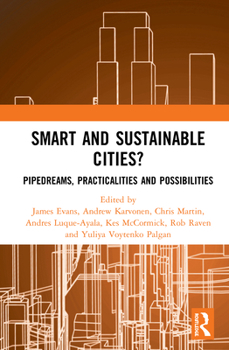Smart and Sustainable Cities?: Pipedreams, Practicalities and Possibilities
Smart cities promise to generate economic, social and environmental value through the seamless connection of urban services and infrastructure by digital technologies. However, there is scant evidence of how these activities can enhance social well-being and contribute to just and equitable communities.
Smart and Sustainable Cities? Pipedreams, Practicalities and Possibilities
provides one of the first examinations of how smart cities relate to environmental and social issues. It addresses the gap between the ambitious visions of smart cities and the actual practices on the ground by focusing on the social and environmental dimensions of real smart city initiatives as well as the possibilities they hold for creating more equitable and progressive cities. Through detailed analyses of case studies in the United States, Australia, the United Kingdom, Japan, Germany, India and China, the contributors describe the various ways that social and environmental issues are interpreted and integrated into smart city initiatives and actions. The findings point towards the need for more intentional engagement and collaboration with all urban stakeholders in the design, development and maintenance of smart cities to ensure that everyone benefits from the increasingly digitalised urban environments of the twenty-first century.The chapters in this book were originally published as a special issue of the journal Local Environment.
Format:Paperback
Language:English
ISBN:0367636808
ISBN13:9780367636807
Release Date:December 2020
Publisher:Routledge
Length:108 Pages
Weight:0.46 lbs.
Dimensions:0.3" x 6.8" x 9.7"
Customer Reviews
0 rating





